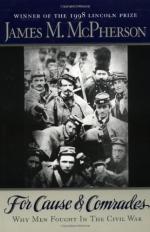
|
| Name: _________________________ | Period: ___________________ |
This test consists of 15 multiple choice questions and 5 short answer questions.
Multiple Choice Questions
1. Which of the following states had the strongest convictions about the war, according to the descriptions of Southern motivations for war?
(a) Maryland.
(b) Virginia.
(c) Mississippi.
(d) Georgia.
2. When discussing various war memoirs, McPherson mentions that James Gooding, a black soldier in the 54th Massachusetts, wrote which of the following?
(a) Hard Marching Every Day.
(b) On The Altar of Freedom.
(c) The Rebel Yell and the Yankee Hurrah.
(d) Hard Tack and Coffee.
3. When a captain from the 1st Connecticut Cavalry wrote about soldiers who shirk their duty, he said that in the company of sixty men only how many were in line?
(a) 32.
(b) 53.
(c) 11.
(d) 48.
4. McPherson notes that at the battle of ___________________ on June 3, 1864, one New York regiment was driven by the Provost Guard at bayonet point.
(a) Petersburg.
(b) Wilderness.
(c) Peach Tree Creek.
(d) Cold Harbor.
5. Toward the end of "Chapter 3: Anxious for the Fray," McPherson notes that men were shocked by war as most of them were in what age group?
(a) 20s.
(b) 30s.
(c) 50s.
(d) 60s.
6. As McPherson discusses the initial impulse that prompted men to enlist on both sides after the raid on Fort Sumter he references which of the following French terms?
(a) Combattre pret.
(b) Vide en haut.
(c) Rage militaire.
(d) Folie.
7. After the battle of Fredericksburg, the 10th New York had fought six battles in as many months and had lost all but how many men?
(a) 68.
(b) 320.
(c) 130.
(d) 240.
8. In July 1861, what battle caused Northern volunteers to flock to the army?
(a) Bull Run.
(b) Chancellorville.
(c) Gettysburg.
(d) Shiloh.
9. During the discussion of primary group cohesion, McPherson says it has existed since time immemorial but was studied during World War II in all BUT WHICH of these soldiers?
(a) American.
(b) German.
(c) British.
(d) Japanese.
10. As McPherson talks about the literacy rates during the Civil War, he says that what percentage of Union soldiers were literate?
(a) 75%.
(b) 65%.
(c) 90%.
(d) 30%.
11. In the discussion of the officers' views on training, which of the following did a captain in the 85th New York NOT believe would get men to fight well?
(a) Drill.
(b) Discipline.
(c) Leadership.
(d) Food.
12. As McPherson discusses religion's role in the Civil War, he notes that a lieutenant from New Jersey who fought in the conflict was what religion?
(a) Mormon.
(b) Atheist.
(c) Quaker.
(d) Jewish.
13. From which state was the soldier who wrote religious poetry while lying in the trenches, during the battle of Vicksburg?
(a) Pennsylvania.
(b) Ohio.
(c) Maryland.
(d) Massachusetts.
14. As McPherson discusses the officer in the 4th Alabama, who was determined to fight a "black republican" leader, he reveals that leader is what relation to him?
(a) Uncle.
(b) Cousin.
(c) Grandson.
(d) Brother-in-law.
15. Soldiers from all BUT WHICH of the following states are mentioned in the discussion of green recruits who wanted to prove their manhood through battle?
(a) Massachusetts.
(b) Indiana.
(c) Illinois.
(d) Tennessee.
Short Answer Questions
1. In the discussion of religious fatalism, what is described as the most dangerous position in the infantry?
2. In 1864, an officer in which regiment wrote of a successful attack on Confederate lines, defending the Weldon Railroad near Petersburg?
3. During the discussion of primary group cohesion, a soldier in the 122nd New York wrote to his sister in response to how he kept going through all BUT WHICH of these battles?
4. After a soldier was killed at the battle of Dranesville in 1861, his younger brother wrote home to say that everyone's time must come; at what battle was the writer later killed?
5. During "Chapter 6: A Band of Brothers," McPherson notes that studies of combat motivation have shown the need of soldiers to prove themselves to wane after how many battles?
|
This section contains 588 words (approx. 2 pages at 300 words per page) |

|




